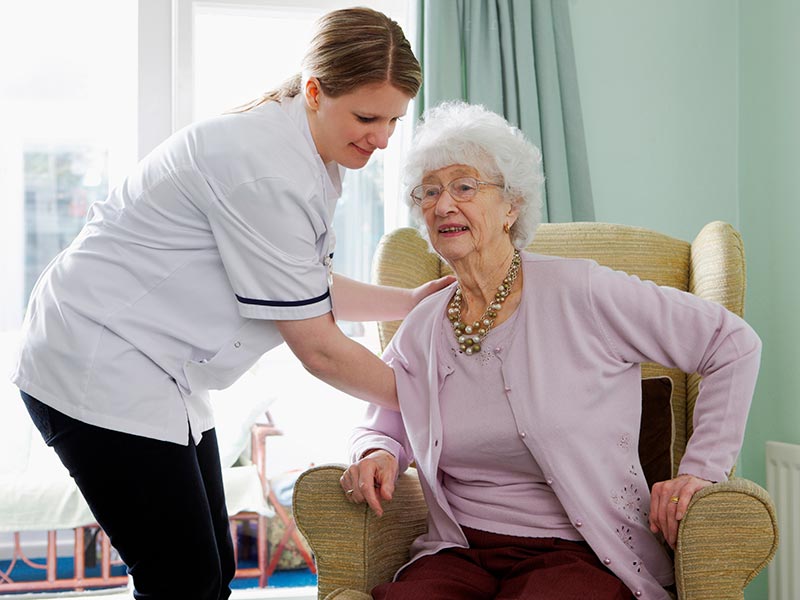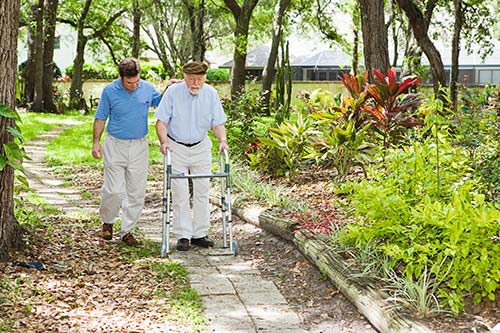




Several key principles underpin health and social care services in Wales. These are:
Mae nifer o egwyddorion allweddol yn ategu gwasanaethau iechyd a gofal cymdeithasol yng Nghymru. Y rhain yw:


The Social Services and Well–Being (Wales) Act 2014 changed the way local authority social services and other care services work together in partnership to help and support individuals.
The Act helps ensure that individuals enjoy well-being in every area of their lives, as much as they choose and are able to. The Act brings together and modernises different pieces of existing social care law.
This new legal framework consists of three elements:
The Act applies to:
The Act is made up of 11 parts, consists of five principles and clearly identifies the individuals the Act affects.
The principles or values of the Act are important as they impact on the way services are provided and how we work with and support individuals.
Newidiodd Deddf Gwasanaethau Cymdeithasol a Llesiant (Cymru) 2014 y ffordd mae gwasanaethau cymdeithasol a gwasanaethau gofal eraill awdurdodau lleol yn cydweithio mewn partneriaeth i helpu a chefnogi unigolion.
Mae'r Ddeddf yn helpu i sicrhau bod unigolion yn mwynhau llesiant ym mhob rhan o'u bywydau, cymaint ag ydynt yn dewis ac yn gallu gwneud. Mae'r Ddeddf yn dwyn ynghyd ac yn moderneiddio gwahanol ddarnau o gyfraith gofal cymdeithasol presennol.
Mae'r fframwaith cyfreithiol newydd hwn yn cynnwys tair elfen:
Mae'r Ddeddf yn gymwys i:
Mae'r Ddeddf mewn 11 rhan, gan gynnwys pum egwyddor, ac mae'n nodi'n glir yr unigolion mae'r Ddeddf yn effeithio arnynt.
Mae egwyddorion neu werthoedd y Ddeddf yn bwysig am eu bod yn effeithio ar y ffordd y darperir gwasanaethau, a sut rydym yn gweithio gydag unigolion ac yn eu cefnogi.
Watch the video about the Act.
Gwyliwch y fideo am y Ddeddf.
What does the Act mean for the individuals we support?
Beth mae’r Ddeddf yn ei olygu i’r unigolion rydym yn eu cefnogi?

The Act is built on the following core principles:
Mae'r Ddeddf yn seiliedig ar yr egwyddorion craidd canlynol:

You have just started working in the health and social care sector. Explain the key points of the Social Services and Well–Being (Wales) Act 2014 as if you were telling an individual that you are supporting.
Rydych newydd ddechrau gweithio yn y sector iechyd a gofal cymdeithasol. Eglurwch brif bwyntiau Deddf Gwasanaethau Cymdeithasol a Llesiant (Cymru) 2014 fel petaech yn dweud wrth unigolyn rydych yn ei gynorthwyo.

There are also numerous other pieces of legislation which are underpinned by the key principles and values mentioned earlier:
Mae llawer o ddarnau eraill o ddeddfwriaeth a gaiff eu hategu gan yr egwyddorion a'r gwerthoedd y soniwyd amdanynt yn gynharach hefyd:

Legislation, national policies and Codes of Conduct and Practice have been developed over time to support the rights of all individuals.
Mae deddfwriaeth, polisïau cenedlaethol a Chodau Ymddygiad ac Ymarfer wedi'u datblygu dros amser i gefnogi hawliau pawb.
It is important that timely advice and assistance is provided to individuals to prevent their situation from getting worse. Stepping in early to help individuals is crucial as it can reduce or delay the need for longer term care and support.
Sean is 84 years old and lives on his own in a very rural part of Wales. His wife died 27 years ago, and his daughter lives in Scotland. Sean has started to develop sight and hearing loss, so now needs help with all aspects of daily living.
Mae'n bwysig sicrhau bod cyngor a chymorth amserol ar gael i unigolion er mwyn atal pethau rhag mynd o ddrwg i waeth. Mae cynnig help ar gam cynnar yn hanfodol oherwydd gall leihau neu oedi'r angen am ofal a chymorth tymor hwy.
Mae Siôn yn 84 oed ac yn byw ar ei ben ei hun yng nghefn gwlad Cymru. Bu farw ei wraig 27 mlynedd yn ôl ac mae ei ferch yn byw yn yr Alban. Mae Siôn wedi dechrau colli ei olwg a'i glyw, felly mae angen iddo gael help gyda phob agwedd ar fywyd beunyddiol erbyn hyn.
| QuestionCwestiwn | Your AnswerEich Ateb | Suggested ResponseYmateb Awgrymedig |
|---|

Individuals have full control when deciding the support they need, and in relation to making decisions about their care and support they are viewed as an equal partner. Individuals can use an independent professional advocate to help them participate fully in the assessment, care and support planning, review and safeguarding processes. Individuals also have a right to an independent professional advocate provided free of charge if they have difficulties in expressing their views, needs, wishes and preferences.
As a worker, this impacts on your role as care and support must now be personalised to the individual through collaboration with them, which may involve support for them from an advocate.
An advocate offers independent support to individuals who might not be heard, to ensure they are taken seriously and that their rights are respected. Advocates also help individuals to access and understand appropriate information and services.
Caiff unigolion reolaeth lawn wrth benderfynu ar y cymorth sydd ei angen arnynt, ac wrth wneud penderfyniadau am eu gofal a'u cymorth fe'u hystyrir yn bartner cyfartal. Gall unigolion ddefnyddio eiriolwr proffesiynol annibynnol i'w helpu i chwarae rhan lawn yn y prosesau asesu, cynllunio gofal a chymorth, adolygu a diogelu. Hefyd, caiff unigolion ddefnyddio eiriolwr proffesiynol annibynnol am ddim os ydynt yn ei chael hi'n anodd mynegi barn, anghenion a dymuniadau.
Fel gweithiwr, mae hyn yn effeithio ar eich rôl yn unol a gofal ac mae’n rhaid i gymorth gael ei deilwra i'r unigolyn drwy gydweithio â nhw, a all olygu cael cymorth eiriolwr.
Mae eiriolwr yn cynnig cymorth annibynnol i unigolion na chânt eu clywed efallai, er mwyn sicrhau eu bod yn cael eu cymryd o ddifrif a bod eu hawliau yn cael eu parchu. Mae eiriolwyr hefyd yn helpu unigolion i gael gwybodaeth a gwasanaethau priodol, a'u deall.
In Wales, the Code of Practice for Social Care Employers (Employers’ Code) sets the standards for employers. Practice guidance gives registered workers guidance related to their role. Other codes include the NHS Wales Code of Conduct for Healthcare Support Workers in Wales, and the Code of Practice for NHS Wales Employers and practice guidance such as the Practice Guidance for Residential Child Care for Workers Registered with the Social Care Wales.
Visit the link below and make a note of 4 requirements for workers explained in the Code.
Code of Professional Practice for Social Care
Yng Nghymru, y Cod Ymarfer ar gyfer Cyflogwyr Gofal Cymdeithasol (Cod Cyflogwyr) sy'n pennu safonau cyflogwyr. Mae canllawiau ymarfer yn rhoi canllawiau i weithwyr cofrestredig sy'n gysylltiedig â'u rôl. Ymhlith y codau eraill mae Cod Ymddygiad GIG Cymru i Weithwyr Cynnal Gofal Iechyd yng Nghymru, a'r Cod Ymarfer ar gyfer Cyflogwyr GIG Cymru a chanllawiau ymarfer fel Canllawiau Ymarfer Gofal Preswyl i Blant ar gyfer Gweithwyr sydd wedi Cofrestru â Gofal Cymdeithasol Cymru.
Ewch i’r ddolen isod a gwnewch nodyn o bedwar gofyniad ar gyfer gweithwyr a eglurir yn y Cod.
Cod Ymarfer Proffesiynol Gofal Cymdeithasol


The NHS Wales Code of Conduct for Healthcare Support Workers in Wales describes what is expected from Healthcare Support Workers employed by NHS Wales in relation to the standards of conduct, behaviour and attitude expected when they are at work. The Code applies to all Healthcare Support Workers employed in clinical and non-clinical environments within the NHS and will be used to reference job descriptions.
The Code provides confidence and reassurance through a framework for public protection incorporating the provision of guidance and support to Healthcare Support Workers about their practice to ensure they understand what standards of conduct employers, colleagues, service users and the public expect them to follow.
The Code sets out standards, so Healthcare Support Workers can be sure what standards they are expected to meet. Healthcare Support Workers should use the Code to assure themselves they are working to the standard and if not then change the way they are working.
Healthcare Support Workers can use the Code to review their practice and identify possible areas for personal development. The Code supports Healthcare Support Workers to fulfil the requirements of their role, behave in the correct way and follow a duty of care and good practice . This is essential to protect service users, public and others from harm and abuse.
Mae Cod Ymddygiad GIG Cymru i Weithwyr Cynnal Gofal Iechyd yng Nghymru yn disgrifio'r hyn a ddisgwylir gan Weithwyr Cymorth Gofal Iechyd a gyflogir gan GIG Cymru o ran safonau ymddygiad ac agweddau disgwyliedig yn y gwaith. Mae'r Cod yn gymwys i bob Gweithiwr Cymorth Gofal Iechyd a gyflogir mewn amgylcheddau clinigol ac anghlinigol yn y GIG, ac fe'i defnyddir mewn cyfeiriadau disgrifiadau swydd.
Mae'r Cod yn rhoi hyder a thawelwch meddwl drwy fframwaith amddiffyn y cyhoedd sy'n cynnwys darparu cymorth ac arweiniad i Weithwyr Cymorth Gofal Iechyd o ran eu hymarfer er mwyn sicrhau eu bod yn deall pa safonau ymddygiad mae cyflogwyr, cydweithwyr, defnyddwyr gwasanaeth a'r cyhoedd yn disgwyl ganddynt.
Mae'r Cod yn nodi safonau, fel y gall Gweithwyr Cymorth Gofal Iechyd fod yn siŵr pa safonau mae disgwyl iddynt eu cyrraedd. Dylai Gweithwyr Cymorth Gofal Iechyd ddefnyddio'r Cod i roi sicrwydd iddynt eu hunain eu bod yn cyrraedd y safon ac, os nad ydynt, newid eu ffordd o weithio.
Gall Gweithwyr Cymorth Gofal Iechyd ddefnyddio'r Cod i adolygu eu hymarfer a nodi meysydd datblygu personol posibl. Mae'r Cod yn helpu Gweithwyr Cymorth Gofal Iechyd i fodloni gofynion eu rôl, ymddwyn yn briodol a dilyn dyletswydd gofal ac arfer da drwy'r amser. Mae hyn yn hanfodol er mwyn amddiffyn defnyddwyr gwasanaeth, y cyhoedd ac eraill rhag niwed a cham-drin.
As a social care worker, you must:
Fel gweithiwr gofal cymdeithasol, mae'n rhaid:

The Practice Guidance for Residential Child Care for Workers Registered with Social Care Wales describes what is expected of workers to support a high-quality service in relation to residential child care.
The guidance can also be used by employers to assess whether they have arrangements in place to ensure a professional and safe service is delivered at all times. The guidance covers child-centred care and support, good residential child care practice, safeguarding individuals, health and safety, professional development, learning culture and contributing to the development of others and contributing to the service, including raising concerns. The guidance builds on the ‘Code of Professional Practice for Health and Social Care’, and failure to follow the guidance could put a workers’ registration at risk.
Mae'r Canllawiau Ymarfer Gofal Preswyl i Blant ar gyfer Gweithwyr sydd wedi Cofrestru â Gofal Cymdeithasol Cymru yn disgrifio'r hyn a ddisgwylir gan weithwyr er mwyn darparu gwasanaeth o ansawdd uchel mewn perthynas â gofal preswyl i blant.
Gall y canllawiau hefyd gael eu defnyddio gan gyflogwyr i asesu p'un a oes trefniadau ar waith ganddynt i sicrhau bod gwasanaeth proffesiynol a diogel yn cael ei ddarparu drwy'r amser. Mae'r canllawiau yn cwmpasu gofal a chymorth sy'n canolbwyntio ar y plentyn, arfer da gofal preswyl i blant, diogelu unigolion, iechyd a diogelwch, datblygiad proffesiynol, diwylliant dysgu a chyfrannu at ddatblygiad pobl eraill a chyfrannu at y gwasanaeth, gan gynnwys codi pryderon. Mae'r canllawiau yn adeiladu ar 'Cod Ymarfer Proffesiynol Iechyd a Gofal Cymdeithasol', a gallai methu â dilyn y canllawiau beryglu cofrestriad gweithwyr.

Social care workers are responsible for making sure that they work to the standards in the Codes of Conduct and Professional Practice. Workers must ensure that their conduct and practice meet the standards, and that no action or omission on their part harms the safety or well-being of individuals.
The Codes of Conduct and Professional Practice provide a criteria to guide the workers’ practice and gives clarity about the standards of conduct that they are expected to meet. Workers are encouraged to use this guidance to examine and reflect on their own conduct and practice and to identify areas in which they can improve.
Mae gweithwyr gofal cymdeithasol yn gyfrifol am sicrhau eu bod yn gweithio yn ôl safonau'r Codau Ymddygiad ac Ymarfer Proffesiynol. Rhaid i weithwyr sicrhau bod eu hymddygiad a'u hymarfer yn cyrraedd y safonau, ac nad oes unrhyw weithred na diffyg gweithredu ar eu rhan yn peryglu diogelwch na llesiant unigolion.
Darperir y Codau Ymddygiad ac Ymarfer Proffesiynol feini prawf i lywio ymarfer gweithwyr, a chynnig eglurder ynghylch y safonau ymddygiad mae disgwyl iddynt eu cyrraedd. Anogir gweithwyr i ddefnyddio'r canllawiau hyn i archwilio a myfyrio ar eu hymddygiad a'u hymarfer eu hunain, a nodi meysydd lle gallant wella.
Social Care workers should be supported and encouraged to follow Codes of Conduct and Professional Practice.
Dylai gweithwyr gofal cymdeithasol gael eu cefnogi a’u hannog i ddilyn Codau Ymddygiad ac Ymarfer Proffesiynol.
Which of the statements below can help social care workers to follow Codes of Conduct and Professional Practice?
Drag the statements into the correct columns.
Pa rai o’r datganiadau isod a all helpu gweithwyr gofal cymdeithasol i ddilyn Codau Ymddygiad ac Ymarfer?
Llusgwch y datganiadau i mewn i’r colofnau cywir.